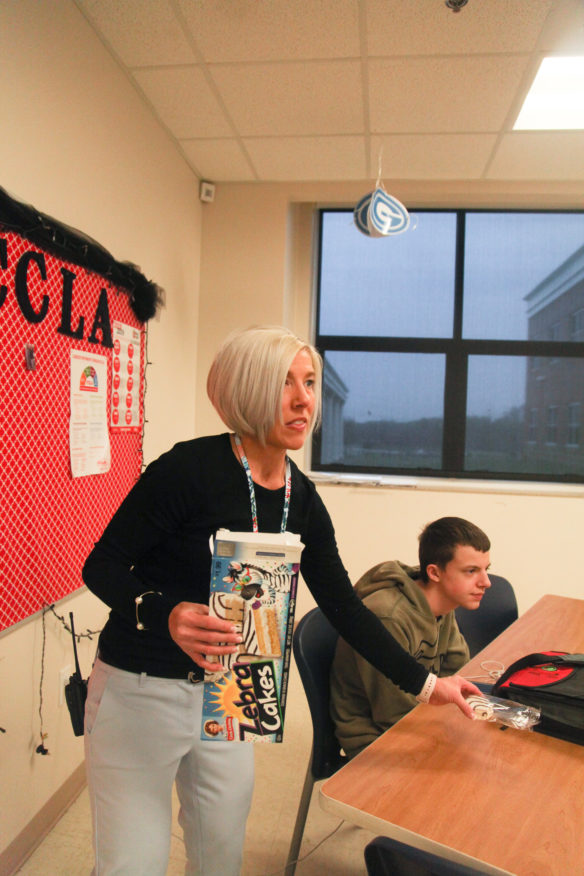
Amy Allen, the principal of Glasgow High School (Glasgow Independent), passes out snack cakes as a reward to students whose class won a motivational “Name That Tune” contest on a Monday morning. The contest is part of a move to celebrate Mondays at the school, which has established a culture that motivates its students to succeed and provides them with the means to do so
Photo by Megan Gross, April 8, 2019
- Glasgow High School is one of six high schools in the United States to be recognized as a model school by the International Center for Leadership in Education.
- The school works to provide an array of opportunities for its students and to help them overcome any barriers to success.
By Mike Marsee
mike.marsee@education.ky.gov
If the students at Glasgow High School want to know where they stand, they only need look around them.
The evidence is on a wall outside the gymnasium, where banners tout not only the school’s athletic and artistic victories, but also its average ACT score ranking and its place in the annual U.S. News and World Report school rankings.
In other hallways around the building, displays celebrate wins by the academic team, high ACT scores and other individual and collective accomplishments.
“Everywhere they look there’s something that is visual that is communicating to them how proud we are of our academic excellence,” Principal Amy Allen said. “They talk about those things. They stand in front of them and they look at them.”
The banners and displays tell the story of a school that pushes its students to succeed by creating a culture that builds in those students a desire to succeed and provides them with the means to do so.
“Everything we do is based on ‘Scottie Pride,’” Allen said. “We don’t want them to be average.”
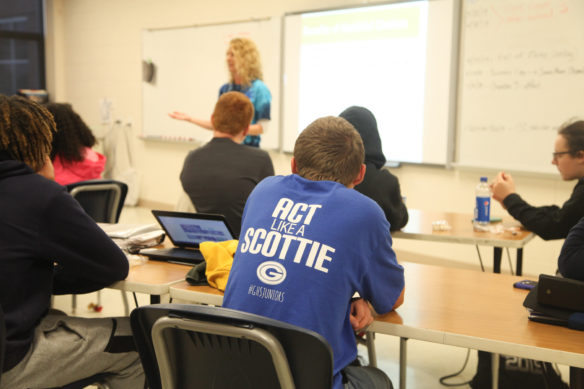
A Glasgow High School (Glasgow Independent) student wears a school T-shirt in Misty Claywell’s foods and nutrition class. The school staff frequently distributes T-shirts – always with a Glasgow Scotties theme – that Principal Amy Allen said help to strengthen the school’s culture.
Photo by Megan Gross, April 8, 2019
Another banner might soon go up to call attention to the fact that Glasgow High School (Glasgow Independent) recently was recognized as one of six model high schools in the United States by the International Center for Leadership in Education. The school was one of 26 schools and districts nationwide honored for making significant improvements in student outcomes by collectively establishing a vision and creating a learning environment that enables students of all abilities to thrive.
Allen said Glasgow was evaluated based on its data over about the past three years in several areas, including ACT scores, reading and mathematics proficiency rates, graduation rate, students in Advanced Placement courses and attendance rate.
She said, however, that data is just one of three areas of emphasis for the school. She said Glasgow’s success also is due in part to the faculty and staff’s passion for students and their work to remove barriers for them, more than 70 percent of whom qualify for free or reduced-price meals.
Students at Glasgow High are presented with an array of opportunities uncommon to schools of its size – fewer than 600 students. The curriculum is designed to give students a chance to succeed in various disciplines. Career pathways and certifications are offered in engineering, advanced medicine, culinary arts, business and marketing, information technology and computer science, and there are and 14 open enrollment Advanced Placement courses in disciplines ranging from English, mathematics and science to history, computer science and art.
“I think that we’re amazing in how much we do offer,” said computer science teacher Larry Correll, who has taught at Glasgow for 21 years. “We’re somehow finding ways to give them opportunities that they just wouldn’t see otherwise.”
Allen said there are several reasons why Glasgow can provide those opportunities, and it starts with a faculty that is willing to go the extra mile. She said teachers are willing to have multiple class preps during the day, as well a schedule that includes both 90-minute block classes and 45-minute modified classes. Many teachers teach the same course in both formats.
All of the teachers in core content areas attend trainings in either Advanced Placement or Laying the Foundation, with the expectation that they will teach an AP course or courses that support AP. AP teachers also teach feeder classes or non-AP classes.
“Those same strategies that move the top 25 percent of students are also used with our students who may need more time, extra support or some interventions to grow academically,” Allen said.
Allen said teams of teachers within vertical alignments identify “non-negotiable” things that students must learn before advancing to the next course, which are communicated between teachers and to students. Student progress is monitored either formally or informally throughout the year.
“Students do not just learn a standard or skill for a test. Instead, they see essential standards for the entirety of the course. This requires our teachers to know their standards deeply and communicate vertically with what students must know before being able to learn those standards,” Allen said.
Allen said student requests have led to the addition of courses in areas such as computer science, information technology and medicine. She said teaching positions have been shifted as needed so the school can offer more career classes, and the superintendent and board of education have shown their support when additional resources or staffing are needed.
“I’m thrilled Glasgow High School has been recognized as a model high school,” said Tara Rodriguez, director of the Kentucky Department of Education’s Division of School and Program Improvement. “The staff shows its dedication to the students and school in so many ways, through the supports provided to make sure students transition successfully to the next level, the culture of school pride and high expectations and the efforts to continually improve opportunity and outcomes for students.”
Students at Glasgow find out quickly that much is expected of them.
“Probably 80 to 85 percent of our students say they are going to college, and the expectation is there that they will take challenging courses,” Allen said.
Correll said students know what those who have gone before them have achieved well before they enter high school.
“From elementary up, they hear about it,” he said. “They know that there are expectations at the high school. They know what our ACTs are.”
Allen said Glasgow Middle School’s principal begins planting the seeds of Glasgow pride in 6th-grade students, and she said the conversations about expectations begin in earnest when high school guidance counselors visit students in the 8th grade.
“We tell them, ‘It’s going to be hard. You’re going to take challenging classes, but here’s what we’re going to do to support you,’” she said.
The support starts with four different events for incoming freshmen before their first day of school.
“We talk to them in little bits and pieces about what it means to be a Glasgow Scottie,” Allen said.
The principal said she meets with freshmen more than with any other students, and an assistant principal is dedicated to the freshman class. The school pays for freshmen to take the ACT, and a guidance counselor reviews the scores with students.
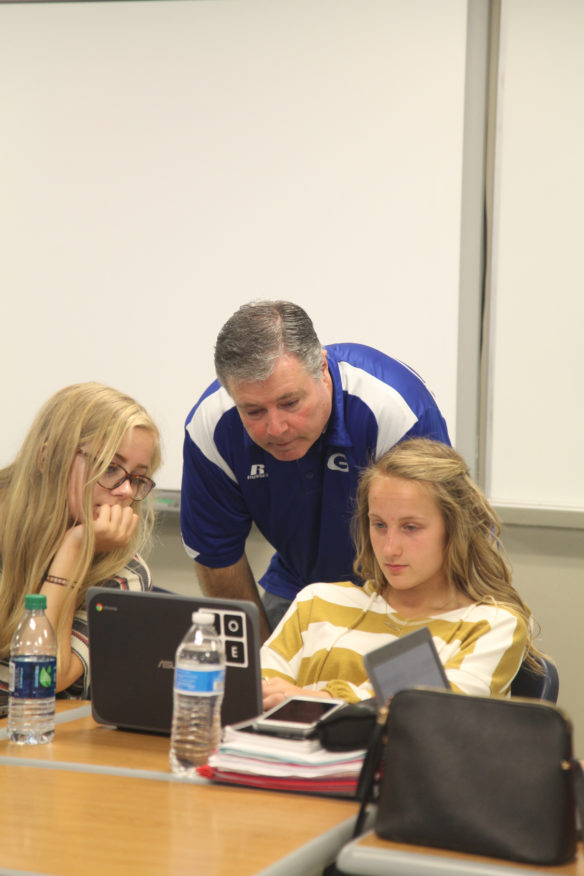
Larry Correll, a computer science teacher at Glasgow High School (Glasgow Independent), works with two students in one of his classes. Computer science is one of nine career pathways offered by the school of fewer than 600 students.
Photo by Megan Gross, April 8, 2019
“A lot of support is given to the freshmen, a lot of resources are given to freshmen. Many of their teachers have common planning periods, and they report to the guidance counselor on who is doing well, who’s struggling, whose family is having hard time,” Allen said.
Glasgow’s staff attempts to helps students overcome barriers of any kind. A youth service center makes sure students’ basic needs are met by providing clothing, shoes and other essentials. Teachers look out for their students as well – some teachers even keep a stash of snacks in their classroom in case a hungry student needs something to get through the morning. Resources are provided on the academic side as well, from technology to grants.
The school also works to customize each student’s educational experience in a number of ways, including flexible scheduling, individual counseling and a personality test that can be used to help them make college and career choices.
The personality test is a key component of Best Fit, an initiative launched two years ago to help students find the colleges and/or careers that are best suited for them. The school develops a four-year plan for each student designed to guide them through graduation and beyond, giving them one-on-one assistance in goal-setting for high school and college admissions, as well as the services of a college coach who visits the school on a regular basis.
“That individualized counseling within Best Fit removed a lot of barriers, and it’s really about removing those barriers to create expectations,” Allen said.
There also are expectations of the teachers at Glasgow, Allen said.
“We always tell our kids more is expected of them, but more is expected of the teachers, too, that are part of this,” she said. “It’s about finding the teachers’ strengths and maximizing their potential.
“It’s not the best fit for everybody, but it’s utopia for people who have that same passion for kids, who aren’t afraid to tell kids they love them.”
She said new teachers are paired with experienced teachers whom administrators think will be a good match as a mentor.
“It doesn’t have to be in their content area, but someone that can help them and talk about what it means to be a Scottie and the pride that goes into everything we do,” Allen said.
Allen said the staff works to make sure all students are progressing, examining data to identify instructional gaps.
“We go line by line for each child,” she said. “That is not sexy, it is not popular and it is a whole lot of hard work. But that’s the culture in our building. Everybody wants to be the very best at everything we do.”
Teachers and students wear that culture on that chests. Allen and her staff frequently hand out T-shirts, and those shirts always feature a Glasgow Scotties theme. It also can be found on social media, where Allen trumpets the successes of students and teachers in any and every area.
And sometimes there are snack cakes. The school and the district celebrate Mondays, and Allen rewards one class with a stack of snack cakes for winning a “Name That Tune” contest during the morning announcements.
“I think our culture has always been at this level,” Correll said. “We’ve carried that attitude since I’ve been here.”
MORE INFO …
Amy Allen amy.allen@glasgow.kyschools.us
Larry Correll larry.correll@glasgow.kyschools.us

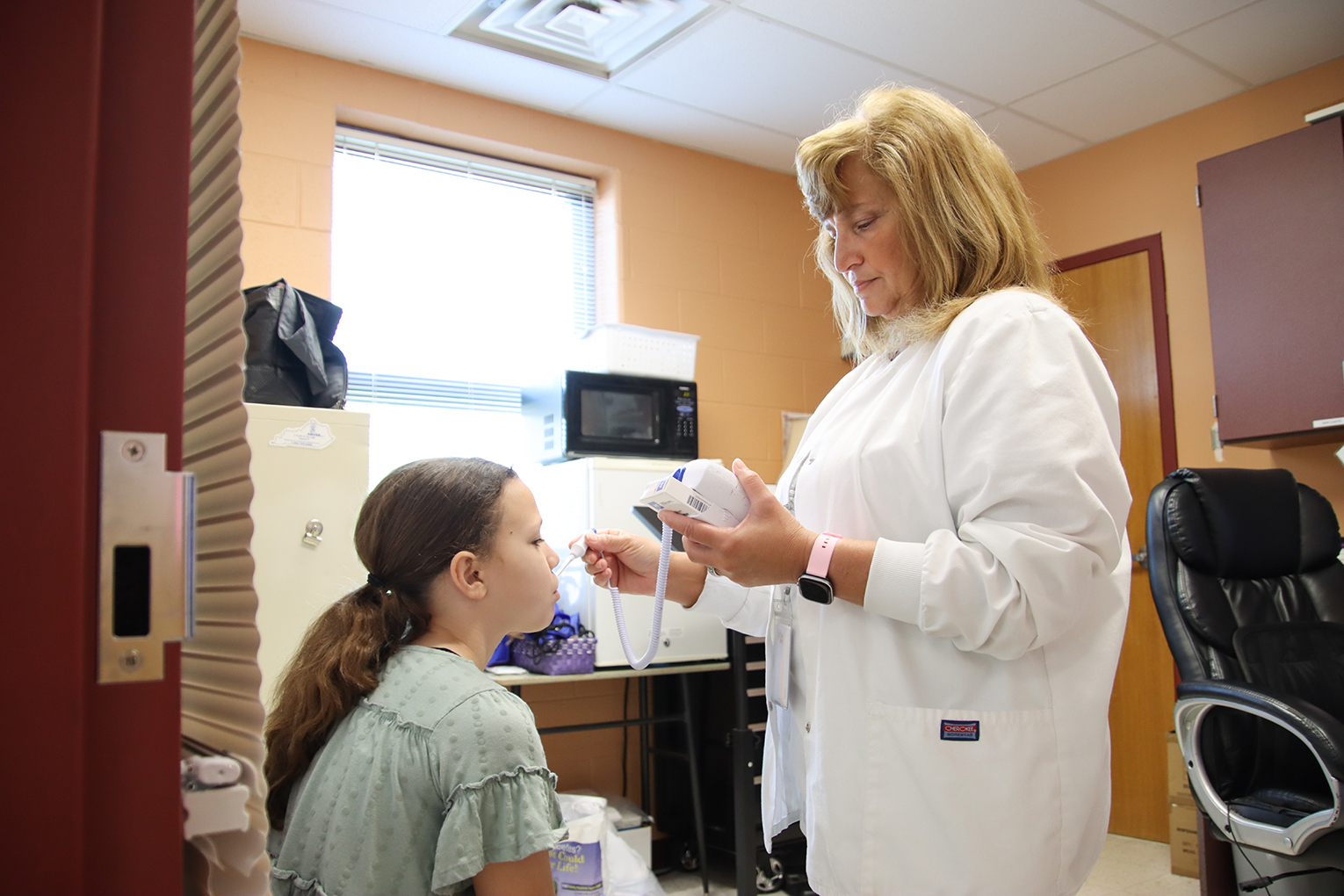
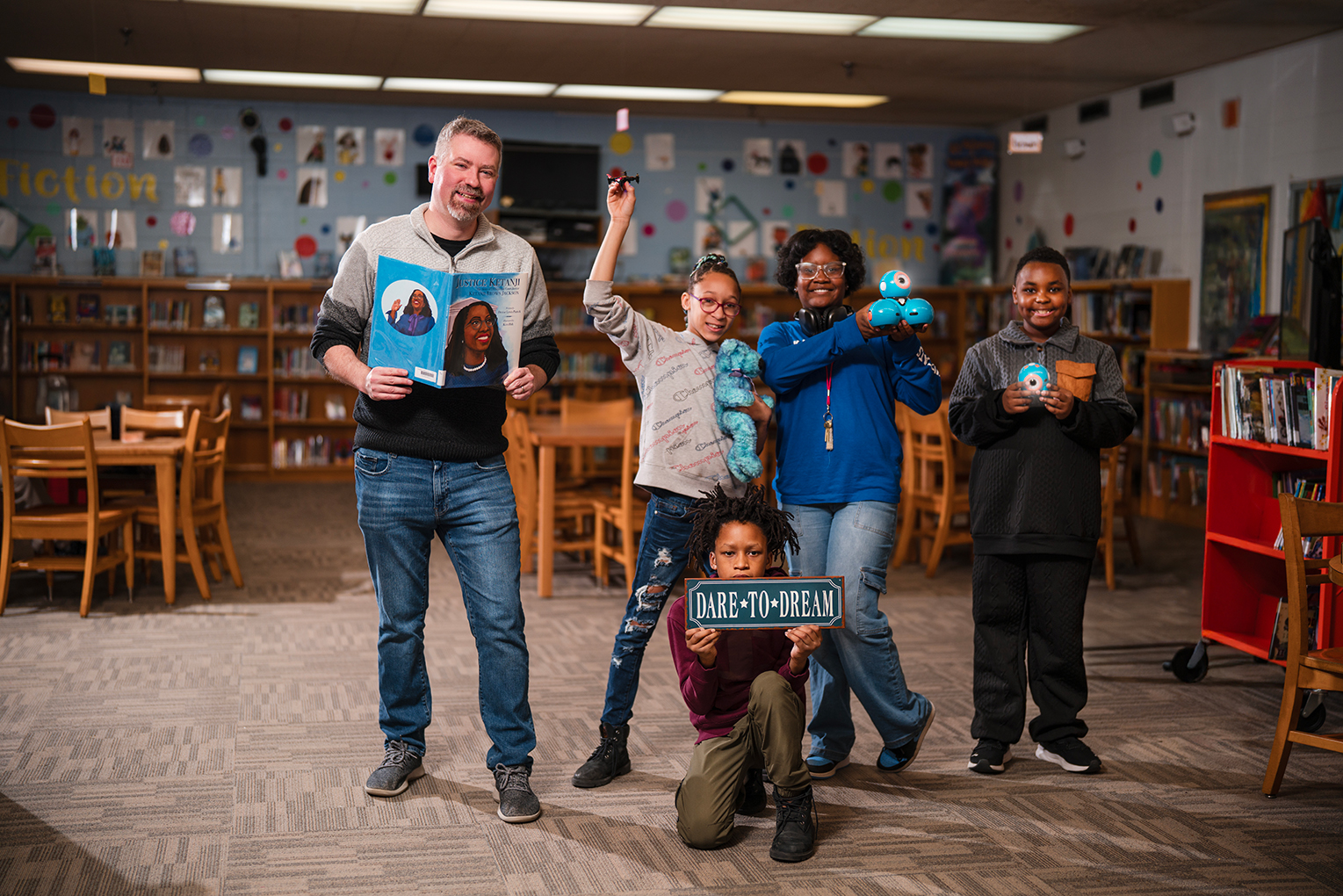

Leave A Comment